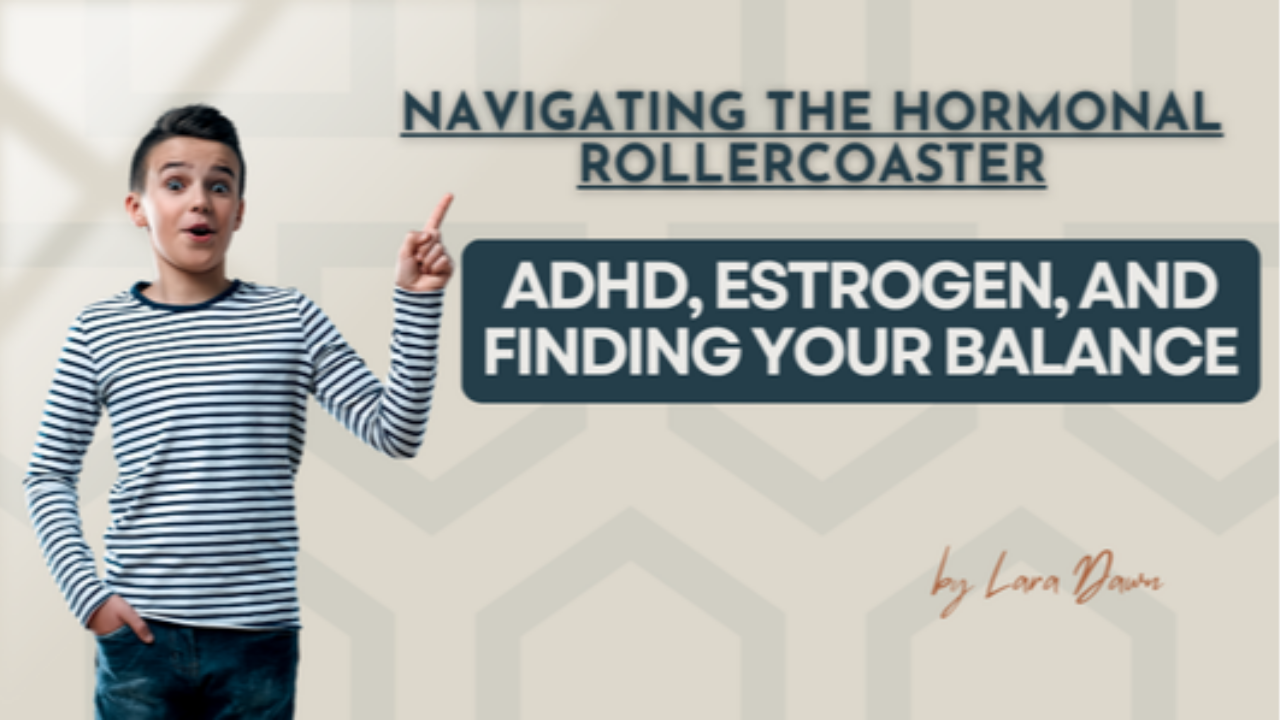
Navigating the Hormonal Rollercoaster: ADHD, Estrogen, and Finding Your Balance
Aug 02, 2025"Your hormones aren't trying to sabotage you—they're signaling you to slow down, tune in, and nourish yourself."
Have you ever woken up and felt like someone swapped your brain overnight for cotton candy? Or found yourself snapping over the tiniest things—like your kid leaving shoes in the doorway (again)? If you're a woman navigating ADHD alongside hormonal shifts like perimenopause or PMS, you’re not losing your mind—you’re experiencing real, biological changes that affect your emotions, cognition, and energy.
Hormones, ADHD, and You: What's Really Happening?
For women with ADHD, fluctuating estrogen levels during perimenopause and the premenstrual phase can amplify existing symptoms. Estrogen isn’t just a reproductive hormone—it significantly influences dopamine, the neurotransmitter crucial for motivation, attention, and mood regulation. When estrogen dips, dopamine takes a hit too, intensifying the emotional, cognitive, and energetic struggles of ADHD.
The Neuroscience Breakdown:
- Emotional shifts: Low estrogen can heighten emotional dysregulation, leading to increased anxiety, irritability, or even depression.
- Brain fog & focus issues: Reduced estrogen impacts dopamine function in the prefrontal cortex (your executive functioning center), exacerbating attention and memory challenges.
- Energy crashes: Hormonal dips can result in deep fatigue or feeling overwhelmed by simple tasks.
You’re Not Alone—My Story
As a mom navigating my own ADHD, I used to think something was seriously wrong with me each time these hormonal waves hit. But now, I understand the neuroscience—and most importantly, I have practical tools through the LOVE Ü Method that have completely shifted my experience.
Practical Tips from the LOVE Ü Method to Regain Balance
- Listen Deeply
Check in daily with how you’re feeling emotionally and physically. Acknowledge when your body is signaling you to slow down, recharge, or simply rest. - Oxytocin Boost
Leverage the power of oxytocin, the "cuddle hormone," by engaging in moments of connection—hug your loved ones, snuggle your pets, or enjoy mindful moments of self-care. Oxytocin directly lowers stress hormones, offering immediate emotional relief. - Values-Based Action
On tough days, reconnect with your core values. Choose tasks and actions that align deeply with your values—like family time, health, or creativity. It grounds you and simplifies decision-making. - Emotional Validation
Remember, hormonal fluctuations and ADHD symptoms are not your fault. Validate your own experiences with kindness and compassion—this is self-regulation at its most powerful. - Visualize Your Balance
Regularly visualize how you want to feel—calm, clear-headed, energized. Small daily visualizations shift your brain into a state of positive expectation, supporting your mental and emotional health. - Energetics & Self-care
Respect your energy fluctuations by working in short, productive bursts. Integrate restful pauses, prioritize nutrition, supplements (like Omega-3s, probiotics, magnesium), and sunlight—all crucial for balancing dopamine and serotonin production.
Gut-Brain Connection: Your Second Brain
Did you know about 90% of serotonin and a significant portion of dopamine are produced in your gut? Improving gut health through probiotics, fiber-rich foods, and a balanced diet can significantly stabilize your mood, enhance focus, and reduce anxiety naturally.
LOVE-Lift Success Story: How Sarah Regained Her Balance
Sarah, a Warrior Mama, struggled with intense irritability and brain fog every month. Using the LOVE Ü Method, she began deeply listening to her body's needs, introduced supplements to support serotonin and dopamine balance, and prioritized connection-based activities with her family. Within a few cycles, Sarah’s mood swings reduced dramatically, and she felt more emotionally stable and focused. Her entire family noticed the shift, and their home became more peaceful and connected.
Your hormonal journey isn't something you need to manage alone—support is available. Lean into your intuition, nurture your body's needs, and remember: parenting really can be easy when you work with your brain, not against it.

